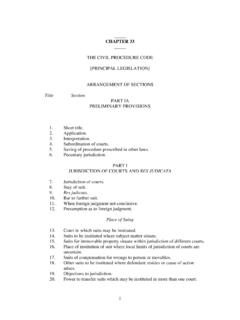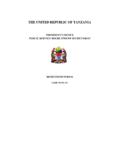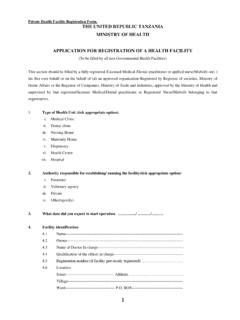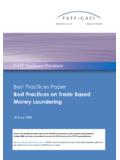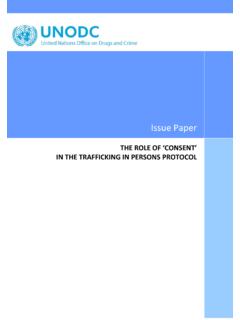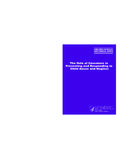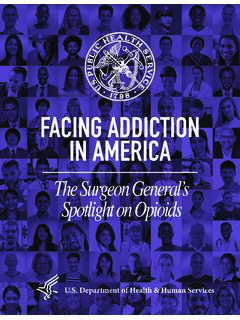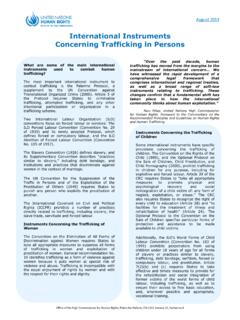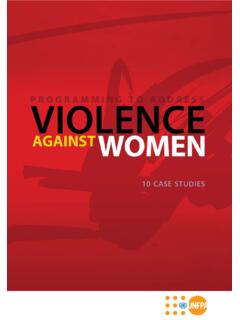Transcription of PREVENTION AND COMBATING OF CORRUPTION - Tanzania
1 _____ CHAPTER 329 _____ THE PREVENTION AND COMBATING OF CORRUPTION ACT [PRINCIPAL LEGISLATION] ARRANGEMENT OF SECTIONS Section Title PART I PRELIMINARY PROVISIONS 1. Short title. 2. Application of the Act. 3. Interpretation. 4. Objective of the Act. PART II ESTABLISHMENT OF THE BUREAU 5. Establishment of the Bureau. 6. Composition of the Bureau. 7. Functions of the Bureau. 8. Powers of the Director-General. 9. Institution of criminal proceedings. 10. Special powers of investigation. 11. Identification and request for assistance. 12. Search warrant. 13. Malicious arrest, prosecution, seizure and exercise of powers. 14. Report of activities. 2 PART III CORRUPTION AND RELATED OFFENCES 15. Corrupt transactions. 16. Corrupt transactions in contracts. 17. Corrupt transactions in procurement. 18. Corrupt transactions in auctions. 19. Application of Act. 20. Corrupt transactions in employment.
2 21. Bribery of foreign public official. 22. Use of documents intended to mislead principal. 23. Persons obtaining advantage. 24. Advantage received on behalf of accused. 25. Sexual favour or any other favours. 26. Public Officials to give accounts of properties. 27. Possession of unexplained property. 28. Embezzlement and misappropriation. 29. Diversion. 30. Aiding and abetting. 31. Abuse of position. 32. Conspiracy. 33. Trading in influence. 34. Transfer of proceeds of CORRUPTION . 35. Presumption of CORRUPTION . 36. False pretence to be an officer. 37. Offence of disclosure of identity. 38. Freezing of assets. 39. Duty to give information. PART IV FORFEITURE OF PROCEEDS OF CORRUPTION 40. Forfeiture of proceeds of CORRUPTION . 41. Notice of application. 42. Forfeiture orders. 3 43. Effects of forfeiture order. 44. Principal may recover secret gifts. PART V INSTITUTIONAL COOPERATION 45. Cooperation with agencies and other authorities.
3 46. Cooperation with private sector. PART VI FINANCIAL PROVISIONS 47. Funds of the Bureau. 48. Estimates. PART VII GENERAL PROVISIONS 49. Valuation of property. 50. General immunity for members. 51. Protection of informers 52. Protection of witnesses, experts and victims. 53. Defect in the appointment, nomination or election. 54. Mutual legal assistance. 55. Extradition. 56. Disclosure of information without prior request 57. Sanction of Director of Public Prosecutions. 58. Trial courts. 59. Regulations. 60. Repeal 4 _____ CHAPTER 329 _____ THE PREVENTION AND COMBATING OF CORRUPTION ACT [ ..] PREAMBLE WHEREAS CORRUPTION is an obstacle to principles of democracy, good governance and human rights and poses a threat to peace, tranquillity and security in the society; AND WHEREAS the Government has resolved to undertake protracted measures that would ensure that Tanzania remain a CORRUPTION free State adhering to the principles of freedom, equality, justice, brotherhood, peace and wherein all people are equal and every person has a right to ownership and protection of property acquired by lawful means.
4 AND WHEREAS technological changes ushered in by globalization and development of science in communication and information technology has made it necessary to re-institute the Bureau, to devise modern tactics and strategies of preventing and COMBATING CORRUPTION , and to review the current legal framework for the purposes of enabling the Bureau to effectively control CORRUPTION and corrupt practices ; AND WHEREAS it is necessary to make comprehensive provisions for the PREVENTION , investigation and COMBATING of CORRUPTION and related offences and to ensure that the Bureau conducts its operations independently and performs its functions effectively; NOW THEREFORE be it ENACTED by Parliament of the United Republic of Tanzania as follows: 5 PART I PRELIMINARY PROVISIONS Short title 1. This Act may be cited as the PREVENTION and COMBATING of CORRUPTION Act.
5 Application of the Act (1) This Act shall apply in Tanzania Mainland. (2) This Act shall also apply to a person who commits any act or omission constituting an offence under this Act where- (a) the act or omission occurs elsewhere than in Tanzania ; or (b) the act or omission is done by that person, or for him, by another person elsewhere than in Tanzania . Interpretation 3. In this Act, unless the context otherwise requires- advantage means a gift or any property movable or immovable, loan, fee, reward or favour and includes valuable consideration of any kind, discount, commission, rebate, bonus, deduction or percentage and employment or services or an agreement to give employment or render services in any capacity; agent includes- (a) any person in the employment of whether under a contract of service, a contract for services or otherwise, whether permanent or temporary, whether paid or unpaid, and whether full-time or part-time and whether such person is a natural person or body of persons or acting for another; (b) a trustee; (c) an administrator or an executor; (d) a public official.
6 Bank account includes any ledger, day book, cash book, account book and any other document including generated, stored, and displayed electronically used in the ordinary course of business by any person carrying on, whether on his own behalf as an agent for another, and whether exclusively or otherwise, any banking business whatsoever or not such 6 person is a bank within the meaning of any law for the time being in force relating to banks; Bureau means the PREVENTION and COMBATING of CORRUPTION Bureau established by Section 5; conflict of interest means a clash between public interest and the private pecuniary or any other interest of the individual concerned; confiscation which includes forfeiture where applicable, shall mean the permanent deprivation of property by order of a court; controlled delivery means the technique of allowing illicit or suspect consignments to pass out of, through or into the territory of one or more States, with the knowledge and under the supervision of their competent authorities, with a view to investigating an offence and the identification of persons involved in the commission of the offence; Director-General means the Director-General of the PREVENTION and COMBATING of CORRUPTION Bureau; Director means a person appointed by the President under this Act to hold the position of a Director in the Bureau; foreign public official means any person holding a legislative, executive, administrative or judicial office of a foreign country, whether appointed or elected.
7 And any person exercising a public function for a foreign country, including for a public agency or public enterprise; freezing means temporarily prohibiting the transfer, conversion, disposition or movement of property or temporarily assuming custody or control of property on the basis of an order issued by a court or other competent authority; informer includes a person who in good faith reports the commission of an offence to the Bureau and includes a whistle blower; Minister means the Minister responsible for good governance; officer means an investigator of the Bureau including the Director General; official of a public international organization means an international civil servant or any person who is authorized by 7 such an organization to act on behalf of that organization; principal includes an employer, a beneficiary under a trust, a trust estate as though it were a person, any person beneficially interested in the estate of a deceased person as though it were a person, and, in relation to a public official, the authority or body of persons in which the public office is held; private sector means the sector of the economy under private ownership in which the allocation of productive resources is controlled by market forces; proceeds of crime means any property derived from or obtained, directly or indirectly, through the commission of an offence under this Act; property includes money, assets of any kind, whether corporeal or incorporeal, movable or immovable, tangible or intangible and any document or legal instrument evidencing title to, or interest in such assets.
8 Public body includes a corporation established by or under the companies Act in which the Government has vested interest; public duty means a duty in the discharge of which the Government, the public or the community at large has an interest; public official means any person holding a legislative, executive, judicial, administrative, political, military, security, law enforcement, and local government authority or any other statutory office and includes- (a) any person performing a public function or providing a public service; and (b) any other person natural or legal so defined in any other written laws. Objective of the Act (1) The objective of this Act is to provide for promotion and enhancement of good governance and eradication of CORRUPTION . (2) In the promotion of the objectives referred to under subsection (1), this Act provides an institutional and legal framework necessary for PREVENTION and COMBATING CORRUPTION by- (a) examining and advising on practices and procedures of 8 public, parastatal and private organisations, in order to facilitate the detection of CORRUPTION or prevent CORRUPTION ; (b) disseminating information to the public on evils and effects of CORRUPTION and corrupt practises as well as negative traditions and usage; (c) cooperating and collaborating with local and international institutions, agencies or organisations in the fight against CORRUPTION ; (d) promote and foster public support in COMBATING CORRUPTION ; and (e) investigate and prosecute offences relating to CORRUPTION .
9 PART II ESTABLISHMENT OF THE BUREAU Establishment of the Bureau (1) There is hereby established the Bureau to be known as the PREVENTION and COMBATING of CORRUPTION Bureau. (2) The Bureau shall be an independent public body. Composition of the Bureau 6. (1) The Bureau shall consist of the Director General, Deputy Director General, and such other officers as may be necessary for efficient and effective carrying out of the functions of the Bureau. (2) The Director-General and Deputy Director-General shall be appointed by the President. (3) The Bureau shall employ such number of staff as may be necessary for efficient performance of the functions of the Bureau. Functions of the Bureau 7. Functions of the Bureau shall be to take necessary measures for the PREVENTION and COMBATING of CORRUPTION in the public, parastatal and private sectors and in that regard, the Bureau shall- (a) examine and advise the practices and procedures of public, parastatal and private organisations, in order to facilitate the detection of CORRUPTION or prevent CORRUPTION and secure the revision of methods of work or procedure which appear to add to the efficiency and transparency of 9 the institution concerned; (b) enlist and foster public support in COMBATING corrupt practices .
10 (c) advise public, private and parastatal bodies on ways and means of preventing corrupt practices , and on changes in methods of work or procedures of such public, private and parastatal bodies compatible with the effective performance of their duties, which the Bureau considers necessary to reduce the incidences of corrupt practices ; (d) cooperate and collaborate with international institutions, agencies or organisations in the fight against CORRUPTION ; (e) investigate and, subject to the directions of the Director of Public Prosecutions, prosecute offences under this Act and other offences involving CORRUPTION ; and (f) investigate any alleged or suspected - (i) offence under this Act; (ii) conspiracy to commit an offence under this Act; (iii) conduct of a public official which is connected to CORRUPTION . Powers of the Director- General (1) The Director-General shall have and exercise powers as stipulated under this Act.
